Cognitive-behavioral therapy (CBT), group psychoeducation, and possibly family therapy may help keep bipolar patients who have been stabilized by medication from relapsing, research suggests.
Now it looks as if teaching various psychosocial interventions in a group setting might be able to do the job as well, according to a study published in the May British Journal of Psychiatry. The lead investigator was David Castle, M.D., a psychiatrist at the University of Melbourne in Australia.
The study population included 72 subjects with bipolar disorder who had been recruited from various settings in or near Victoria, Australia. Some subjects were receiving private care, others public care. All were on psychotropic medications and stabilized at the time of study entry.
Subjects were randomized to either a control group or an experimental group for the 12-week study period.
During this time, the control group received treatment as usual—that is, psychotropic medications—and weekly telephone calls to maintain engagement in the trial and to control for this aspect of contact time in the experimental group.
The experimental group received psychotropic medications plus a structured group psychosocial intervention consisting of an eclectic mix of psychosocial education, CBT, dialectical behavior therapy (that is, learning certain stress-tolerance skills), social rhythms, and motivational interviewing aimed at helping participants deal with their health vulnerabilities and cope with stress.
Moreover, during the 12-week period, the experimental group received weekly telephone calls to remind them about the next group session and to offer support for any homework assignment that arose during the group intervention. After the study period ended, this group received three monthly “booster” sessions to reinforce skills that they had learned.
During the nine months following the 12-week study period, subjects were evaluated for relapses using DSM-IV-TR criteria.
The data indicated that the experimental group experienced significantly fewer relapses than the control group did, whether depressive, manic, hypomanic, mixed, or other. For instance, regarding depression relapses, 15 were experienced by control-group subjects, but only four by experimental-group subjects. In addition, six of the control subjects experienced mania relapses, while none of the experimental group did.
Thus, it looks as if the group intervention reduced the risk of relapse in subjects with bipolar disorder, the researchers concluded.
They noted, however, that the results need to be confirmed in another trial, and preferably one in which subjects and those conducting the assessments would be blinded as to who was receiving the experimental intervention, which was not the case in this study.
The study was funded by the Medical Benefits Fund Foundation and Victorian Center of Excellence in Depression and Related Disorders.
